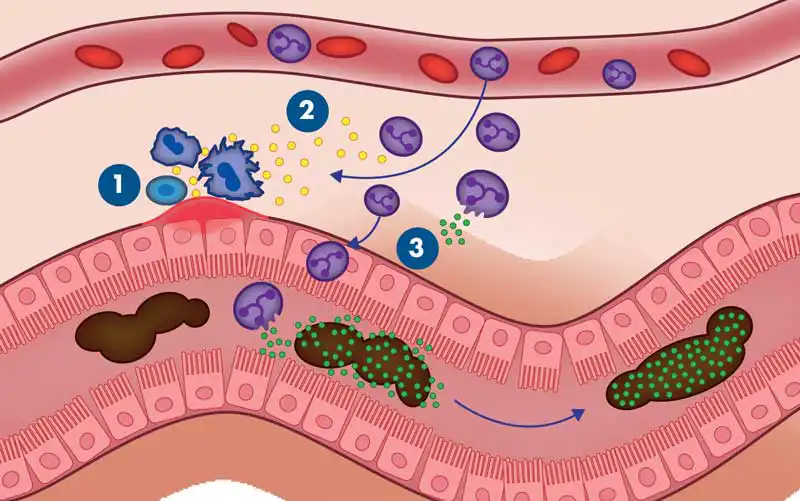Advertorial
16 June 2025
Is faecal calprotectin the missing link in your inflammatory GI cases?
The article covers faecal calprotectin, a non-invasive tool that supports the diagnosis and monitoring of gastrointestinal inflammation.

Gastrointestinal inflammation in dogs can be frustrating to manage – especially when invasive diagnostics such as endoscopy or biopsy aren’t an option.
Faecal calprotectin offers a fast, affordable and evidence-based tool to support clinical decision-making in inflammatory enteropathies, from initial diagnosis through to monitoring and treatment response.
Faecal calprotectin at a glance
- A biomarker released by neutrophils during intestinal inflammation
- Validated in human medicine and included in National Institute for Health and Care Excellence (NICE) guidelines for IBD screening and monitoring1
- Supports diagnosis, monitoring and owner communication in canine inflammatory enteropathies
- GIQuest: a clinically validated, patient-side lateral flow test that delivers results in just 15 minutes
You can find out more at the website here.
Why it matters
Enteropathies rank among the most common disorders in veterinary practice, with a prevalence of more than 10% in dogs2. Vomiting, diarrhoea and weight loss are frequent presenting signs, but reaching a definitive diagnosis is not always straightforward.
Definitive diagnosis of conditions like canine inflammatory bowel disease (IBD) typically relies on invasive investigations such as endoscopy or biopsy. But these are costly, require anaesthesia and carry risks, with complication rates following full-thickness small intestinal biopsies around 12%3.
Faecal calprotectin offers a non-invasive adjunct for assessing gastrointestinal inflammation. Well-established in human gastroenterology, a growing body of evidence supports its use in the diagnosis and monitoring of chronic GI disease in veterinary medicine.
What is calprotectin?

Faecal calprotectin is a neutrophil-derived biomarker of gastrointestinal (GI) inflammation4,5. During GI inflammation the innate and adaptive immune responses are stimulated, resulting in an influx of phagocytic cells and the release of inflammatory cytokines. These, in turn, chemoattract neutrophils and trigger a cascade of events leading to neutrophil disintegration (Figure 1).
Calprotectin makes up around 60% of the neutrophil’s cytosol (fluid within a cell’s cytoplasm). As neutrophils disintegrate, calprotectin is released into the gut lumen, where it enters the faecal stream, and can be measured.
Importantly, calprotectin is resistant to degradation by faecal bacteria and stable at room temperature for up to a week. This means the level of faecal calprotectin reflects the degree of neutrophil infiltration in the GI mucosa during inflammation4,5.
Clinical applications of faecal calprotectin in practice
Elevated faecal calprotectin may be seen in a range of conditions involving intestinal inflammation, including:
- Inflammatory bowel disease (IBD)6
- Cutaneous adverse food reactions (CAFR)7
- Small intestinal neoplasia8
- Oral non-steroidal anti-inflammatory (NSAID) use9
- Small intestinal dysbiosis
Recent UK validation data using the GIQuest lateral flow test has confirmed the test’s diagnostic utility in clinical settings. In a study from the University of Bristol comparing healthy dogs and those with histologically confirmed inflammatory enteropathy, calprotectin levels demonstrated clear separation between groups. Using a threshold of 3mg/kg, the test showed 94% sensitivity and 96% specificity10.
Faecal calprotectin can support early decision making in dogs with GI signs, guide the need for further investigation and help differentiate inflammatory from non-inflammatory disease. It is particularly useful when biopsy or referral is not an option.
It also plays a valuable role in treatment monitoring, after diagnosis has been made. Calprotectin levels may decline before clinical signs improve, offering early reassurance during elimination diet trials or immunosuppressive therapy. This initial biomarker response can help reinforce owner compliance when clinical improvements are subtle or slow to appear.
In human medicine, calprotectin is used to evaluate treatment efficacy, anticipate relapse and reduce unnecessary endoscopic reassessment. Its use in veterinary medicine could offer similar benefits – helping to tailor therapy more precisely and support clinical decisions with objective data.
Why GIQuest?
GIQuest is a faecal calprotectin point-of-care test that provides fast, actionable insights into gut integrity, supporting diagnosis and treatment monitoring and helping to reveal the next step for GI cases.
- Fast: results in just 15 minutes from a small faecal sample
- Non-invasive: no anaesthesia or sedation required
- Cost-effective: supports clinical decision-making affordably
- Clinically validated
Find out more
To learn how GIQuest can support your approach to inflammatory GI cases contact Carus Animal Health [email protected]
References
- National Institute for Health and Care Excellence (2013). NICE Guidance DG11. Faecal calprotectin diagnostic tests for inflammatory diseases of the bowel, https://www.nice.org.uk/guidance/dg11
- O’Neill DG et al (2021). Prevalence of commonly diagnosed disorders in UK dogs under primary veterinary care: results and applications, BMC Vet Res 17(1): 69.
- Maggiar A et al (2023). Intestinal full-thickness needle-core biopsy via laparotomy is safe, rapid and effective and less invasive than standard incisional biopsy in dogs and cats, AVMA 262: 4 https://doi.org/10.2460/javma.23.09.0521
- Däbritz J, Musci J and Foell D (2014). Diagnostic utility of faecal biomarkers in patients with irritable bowel syndrome, World J Gastroenterol 20(2): 363-375.
- Jukic A et al (2021). Calprotectin: from biomarker to biological function, Gut 70(10): 1,978-1,988.
- Otoni CC et al (2018). Serologic and fecal markers to predict response to induction therapy in dogs with idiopathic inflammatory bowel disease, J Vet Intern Med 32(3): 999-1,008 https://doi.org/10.1111/jvim.15123
- Badri D et al (2019). Curr Dev Nutr 3(suppl.1): nzz033.Po0-001-19
- Ross FA et al (2022). The role of faecal calprotectin in diagnosis and staging of colorectal neoplasia: a systematic review and meta-analysis, BMC Gastroenterol 22: 176 https://doi.org/10.1186/s12876-022-02220-1
- Herstad KMV et al (2022). Effects of canine-obtained lactic-acid bacteria on the fecal microbiota and inflammatory markers in dogs receiving non-steroidal anti-inflammatory treatment, Animals 12(19): 2,519 https://doi.org/10.3390/ani12192519
- University of Bristol 2025 study data

